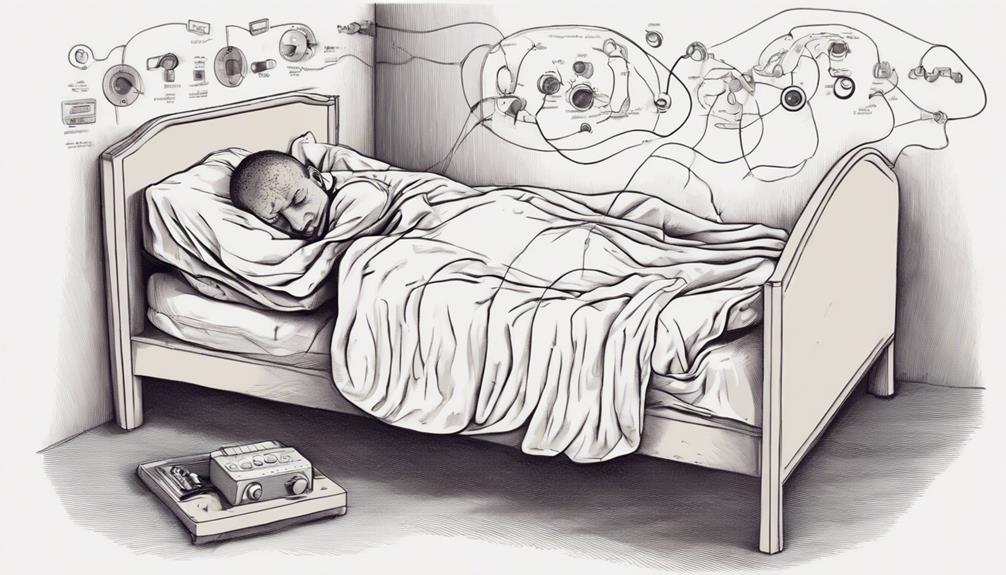As we consider the impact of scarlet fever on individuals, let’s ponder the potential link to hearing loss. Imagine a child recovering from scarlet fever, but having difficulty hearing conversations clearly. Could this be a result of the infection?
The connection between scarlet fever and hearing loss raises intriguing questions about the long-term effects of this illness. Join us as we explore the nuances of this relationship and uncover ways to safeguard against such complications.
Key Takeaways
- Scarlet fever can cause hearing loss due to bacterial inflammation in the ear.
- Early diagnosis and antibiotic treatment are crucial to prevent hearing complications.
- Monitoring for potential hearing problems is essential after scarlet fever.
- Preventing scarlet fever through vaccination and hygiene practices is key to avoiding hearing loss.
Scarlet Fever Overview
Scarlet fever, caused by Streptococcus bacteria, is a bacterial infection that presents symptoms typically within 2 to 5 days after initial infection. One potential complication associated with scarlet fever is hearing loss. Although hearing loss is a rare occurrence with scarlet fever, it's crucial to be aware of this possible outcome.
The Streptococcus bacteria responsible for scarlet fever can sometimes lead to an inflammation of the structures within the ear, affecting hearing. This complication underscores the importance of promptly seeking medical attention if scarlet fever is suspected, as early diagnosis and treatment can help prevent further complications such as hearing loss.
Patients with scarlet fever should be monitored closely for any signs of hearing impairment, and if detected, appropriate interventions should be initiated without delay. By understanding the potential link between scarlet fever and hearing loss, individuals can take proactive steps to mitigate such risks and ensure optimal health outcomes.
Symptoms and Diagnosis

Typically, symptoms of the bacterial infection known as scarlet fever manifest within 2 to 5 days following the initial infection. Common signs of scarlet fever include a red rash, sore throat, fever, and a "strawberry" tongue. In some cases, scarlet fever can lead to complications such as rheumatic fever or kidney problems, but one lesser-known complication is sensorineural hearing loss. This type of hearing loss affects the inner ear or the nerve pathways from the inner ear to the brain, and it can be permanent if not addressed promptly. Early diagnosis of scarlet fever is crucial to prevent potential complications like hearing loss. Below is a table summarizing the symptoms and diagnosis of scarlet fever:
| Symptom | Description |
|---|---|
| Red rash | Fine, sandpapery rash that feels like sandpaper |
| Sore throat | Painful, red throat with white patches |
| Fever | High fever above 101°F (38.3°C) |
| "Strawberry" tongue | Tongue appears red with small bumps resembling seeds |
| Headache | Persistent or severe headaches |
Treatment Options
When considering treatment options for scarlet fever-related hearing loss, antibiotic therapy plays a crucial role in managing the infection and minimizing the risk of long-term complications like permanent hearing impairment. Here are some key points to consider:
- Antibiotic Treatment: Prompt initiation of antibiotics is essential to combat the underlying streptococcal infection causing scarlet fever and reduce the risk of associated complications, including hearing loss.
- Monitoring and Follow-Up: Regular monitoring by healthcare professionals is necessary to track the progress of treatment, ensure the infection is adequately controlled, and assess any impact on hearing function.
- Surgical Interventions: In cases where conductive hearing loss persists despite antibiotic therapy, surgical procedures may be recommended to address specific issues within the ear that are contributing to the hearing impairment.
- Advancements in Care: Ongoing advancements in medical care have significantly improved outcomes for individuals experiencing hearing loss due to scarlet fever, offering more effective treatment options and better long-term prognosis.
Complications and Risks

Complications and risks associated with scarlet fever often manifest in various forms of hearing impairment, ranging from conductive to sensorineural loss. Middle ear issues resulting from scarlet fever can lead to conductive hearing loss, where sound transmission is hindered.
Additionally, systemic poisoning associated with scarlet fever can cause sensorineural hearing loss, affecting the inner ear's ability to convert sound vibrations into electrical signals for the brain. In severe cases of scarlet fever with complications, deafness can be a consequence, highlighting the seriousness of this condition.
It's crucial for individuals recovering from scarlet fever to be monitored for potential hearing problems to ensure timely intervention. Fortunately, with prompt medical attention, permanent hearing loss can often be prevented in scarlet fever patients. Understanding the risks and potential complications related to scarlet fever underscores the importance of comprehensive care and follow-up to safeguard against hearing impairments.
Prevention and Hearing Loss

To reduce the risk of complications such as hearing loss related to scarlet fever, implementing preventive measures like maintaining good hygiene practices is crucial. When it comes to preventing hearing loss associated with scarlet fever, several key strategies can be highly effective:
- Handwashing: Regular and thorough handwashing can help prevent the spread of scarlet fever, reducing the risk of complications like hearing loss.
- Timely Antibiotic Treatment: Prompt treatment with antibiotics for scarlet fever can significantly decrease the likelihood of developing severe complications, including hearing impairment.
- Early Symptom Awareness: Educating individuals about the early signs of scarlet fever can lead to timely medical intervention, potentially preventing hearing-related issues.
- Vaccination: Encouraging vaccination against streptococcal infections, which can trigger scarlet fever, is crucial in preventing the disease and its associated complications like hearing loss.
Frequently Asked Questions
Can Scarlet Fever Cause Hearing Issues?
Yes, scarlet fever can cause hearing issues. Complications such as middle ear infections can lead to hearing loss.
Sensorineural hearing loss may result from systemic poisoning caused by scarlet fever. Additionally, conductive hearing loss often occurs due to middle ear problems related to scarlet fever.
Historical cases like Helen Keller's hearing loss underscore the potential impact of scarlet fever on hearing. Early detection and treatment are crucial in preventing these potential hearing complications.
Does Scarlet Fever Cause Blindness and Deafness?
Scarlet fever doesn't typically cause blindness, but can lead to deafness due to complications like conductive or sensorineural hearing loss. Historical figures like Helen Keller and Thomas Edison lost their hearing from scarlet fever. Middle ear issues can result in conductive hearing loss, while systemic poisoning can cause sensorineural hearing loss.
Awareness of these risks is crucial for prevention and early intervention. It's important to monitor hearing health when dealing with scarlet fever.
What Fevers Cause Hearing Loss?
Fever-related hearing loss can stem from various sources, including infections like meningitis, mumps, or scarlet fever. These illnesses can lead to conductive or sensorineural hearing impairments.
Timely medical intervention for the underlying fever is crucial to prevent permanent hearing damage. Awareness of the potential link between fevers and hearing loss can aid in early detection and appropriate treatment strategies.
Understanding these connections enhances our ability to address hearing health concerns effectively.
Can Scarlet Fever Cause Ear Infection?
Scarlet fever can indeed cause ear infections. The bacterial infection associated with scarlet fever can lead to middle ear complications, potentially resulting in conductive hearing loss. This hearing impairment may be temporary or permanent, making prompt treatment crucial to minimize the risk of such complications.
Scarlet fever's impact on the ears highlights the importance of managing this condition effectively to prevent further health issues.
Conclusion
In conclusion, preventing scarlet fever is crucial in avoiding potential complications like hearing loss.
Just as a well-tuned orchestra requires each instrument to play in harmony, our bodies rely on all systems functioning properly to maintain good health.
By staying vigilant, seeking prompt treatment, and following preventive measures, we can protect our hearing and ensure our overall well-being is in tune.










